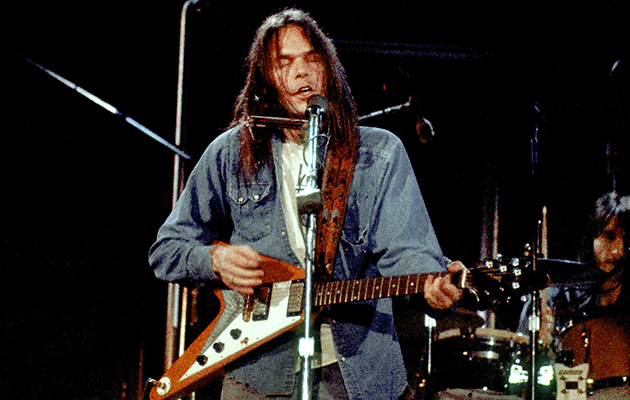Neil Young is an artist who prizes passion over polish, raw power over perfect technique. But there’s something about 1973’s Time Fades Away that has always cut too close to the bone even for him. “I think it’s the worst record I ever made,” he told Dave Ferrin in 1987. Recorded live in Am...
Neil Young is an artist who prizes passion over polish, raw power over perfect technique. But there’s something about 1973’s Time Fades Away that has always cut too close to the bone even for him. “I think it’s the worst record I ever made,” he told Dave Ferrin in 1987. Recorded live in America during early ’73 (but made up of entirely new songs), the album should’ve been a triumph for Neil; it came on the heels of the songwriter’s chart-topping blockbuster Harvest.
With “Heart Of Gold” and “Old Man” breezing across the airwaves, Young was suddenly able to fill huge stadiums and arenas on his own, without the help of C, S or N. But the sudden death in November 1972 of Crazy Horse guitarist Danny Whitten looms over Time Fades Away (and, of course, the grief-stricken Tonight’s The Night, which was recorded later in ’73) and as a consequence, it seemed as though Young would rather let Time Fades Away just fade away.
Order the latest issue of Uncut online and have it sent to your home!
So that’s why Tuscaloosa, the 11th release in the songwriter’s ongoing archival Performance Series, comes as a bit of a surprise. Uncovered by engineer John Hanlon late last year, the rich, crystal-clear recording captures Neil with the Stray Gators down in Alabama early on during the Time Fades Away tour. So impressed was Young with Hanlon’s find that he apparently postponed the release of Odeon-Budokan – a prized Crazy Horse-era live set from 1976 – in favour of this.
It’s certainly a revelatory listen, giving us a fuller picture of what Young was up to onstage at this crucial turning point in his career. It’s a fan-friendly set, with faithful renditions of “Heart Of Gold”, “After The Gold Rush”, “Out On The Weekend” and other favourites complementing the fresher material. And though audience tapes from the tour sometimes show Young in a cranky, confrontational mood, he’s easygoing and wry here, cracking jokes between songs and making light of his newfound commercial success (Neil introduces “Heart Of Gold” as “Burger Of Gold”). Think of Tuscaloosa as Time Fades Away’s kinder, gentler cousin. But don’t worry – it’s still got plenty of bite.
And speaking of bite – Tuscaloosa is a sparkling showcase for the Stray Gators, who appear on all but the first two tracks, solo acoustic numbers. Made up of pedal steel/slide guitar maestro Ben Keith, pianist Jack Nitzsche, drummer Kenny Buttrey and bassist Tim Drummond, the group was one of Young’s subtlest, most sensitive combos, blending session-player expertise with a deliciously stoney looseness.
Tuscaloosa is further distinguished from Time Fades Away since it features Buttrey – Young replaced him with the harder-hitting Johnny Barbata later in the tour. Whatever his boss’s complaints may have been at the time, Buttrey, one of country rock’s primary rhythmic architects, is terrific here, his in-the-pocket groove giving even the slowest songs an added buoyancy. And he’s certainly capable of thunderous stadium-ready playing; his powerful fills on a fiery “Alabama” (an inevitable, but still bold, choice to play in Tuscaloosa) leave the studio version in the dust.
Ben Keith is also a vital part of Tuscaloosa’s overall success, his liquid lines connecting the Stray Gators’ sound to a classic Nashville heritage, but also giving the band a spaced-out, wide-open flavour at times. Like Buttrey, Young had first hooked up with the multi-instrumentalist during the initial Harvest sessions, and Keith would become a constant companion both live and in the studio until his death in 2010. The chemistry between Young and Keith is already readily apparent at this early stage in the relationship, whether the pair is trading spicy riffs on a rollicking “Lookout Joe” or harmonising raggedly on an electric/electrifying “New Mama” (which would later show up in acoustic guise on Tonight’s The Night).
Although technically they were only in existence for two years – from 1971–1973 – the Stray Gators became a critical part of Young’s story. Young’s first band since the Whitten-era Crazy Horse collapsed, they help Young bridge the gap between the Horse’s early glories and the reflective, expansive music he made on On The Beach and Tonight’s The Night.
Complaints? Well, as is Young’s usual MO, Tuscaloosa is only a sampling of the set Neil and the Stray Gators played on this particular evening. Unlike the Grateful Dead, Springsteen or Dylan, Young remains resistant to releasing complete shows, making it still necessary to seek out murky bootlegs. Nevertheless, Tuscaloosa is an incredibly valuable document of Neil Young in 1973, battling his demons in front of thousands and delivering some of his most deeply felt music.
The record comes hot on the heels of two other mid-’70s archival efforts – Songs For Judy and Roxy: Tonight’s The Night Live – and it’s a blessing that Neil is finally letting fans hear this buried treasure from one of his peak periods, rather than moving forward and resolutely defying expectations in his usual way. Can the man’s ultimate lost album, 1975’s Homegrown, be far behind? Maybe – but likely not before the just-announced new Crazy Horse LP lands this autumn.



